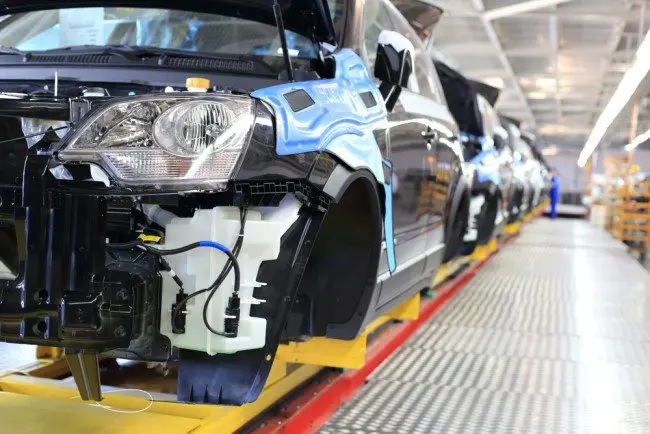Investment in Britain’s car industry has fallen by half, according to figures from the motoring sector.
The Society of Motor Manufacturers & Traders (SMMT) said that Brexit uncertainty was “thwarting” decisions by major car companies to put more money into UK factories.
In the first six months of 2017, investment in new models and factory improvements stood at £647.4m.
This year, the figure had fallen to £347.3m for the same period.
The SMMT said this was lowest figure since the financial crisis.
The trade body said that the government’s “red lines” on Brexit and “conflicting messages” were working “directly against the interests of the UK automotive sector”.
Its chief executive, Mike Hawes, told the BBC that the industry needed “clarity” and demanded that Britain stay within the customs union and that a “no deal” scenario – where the UK leaves the customs union and the single market with no preferential trading deal – would be “the worse option imaginable”
Supply chains which rely on millions of car and truck parts moving freely between the UK and the EU would face disruption.
The government said the UK’s car industry was a success story and that it was working for a deal that was mutually beneficial to both sides and as “friction free” as possible.
No post Brexit plan
Since the referendum a number of car makers, such as Nissan, have announced additional investment in Britain.
The SMMT’s annual Sustainability Report says that the automotive sector had a strong 2017 as investments made a number of years ago came to fruition.
Employment levels rose by over 5% to 186,000 and the sector’s total revenues hit a record £82bn.
“There is no credible ‘plan B’ for frictionless customs arrangements, nor is it realistic to expect that new trade deals can be agreed with the rest of the world that will replicate the immense value of trade with the EU.” Mr Hawes said.
“The government must rethink its position on the customs union.
He said: “There is no Brexit dividend for our industry, particularly in what is an increasingly hostile and protectionist global trading environment.
“Our message to government is that until it can demonstrate exactly how a new model for customs and trade with the EU can replicate the benefits we currently enjoy, don’t change it.”
He said both of the government’s options for cross-border arrangements post-Brexit – the so-called “maximum facilitation” or “customs partnership” models– were complex, expensive and not deliverable over a short period of time.
The government said that, out of the EU, Britain could look to strike new trade deals with markets such as America and China.
“We’re confident of securing a good deal with the EU that’s mutually beneficial, and allows for the most free and frictionless trade with our European neighbours,” a spokesperson said.
“The UK automotive industry remains one of our great success stories and a whole host of companies have recently committed to investing billions of pounds in the sector, including Nissan, Toyota, BMW and Vauxhall.
“Through our modern Industrial Strategy and landmark Automotive Sector Deal, we are working with the sector to put the UK at the forefront of new automotive technologies to ensure we remain the destination of choice for future investment.”


